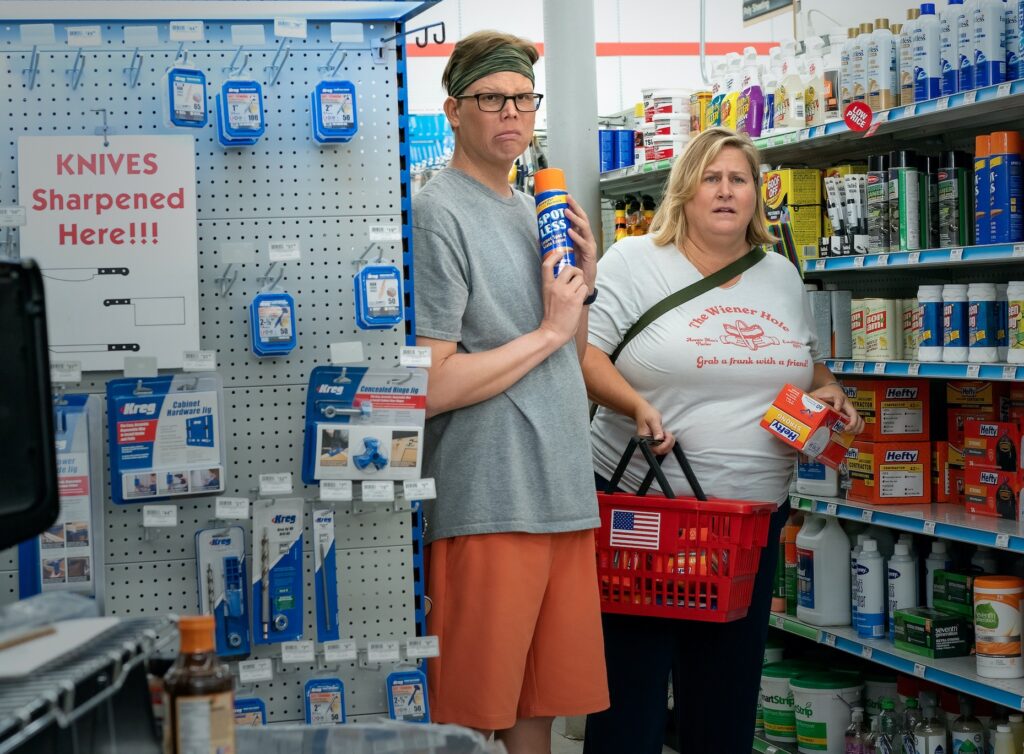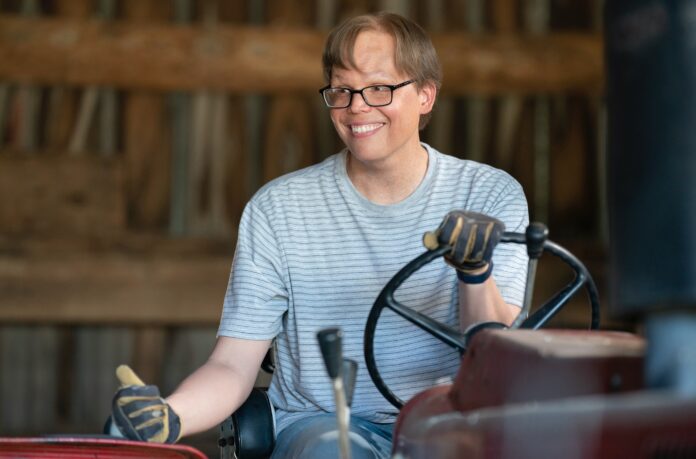It’s hard to imagine Jeff Hiller making people mad. But in 2004, that was the 46-year-old comedian and actor’s job. It was his responsibility to get folks angry — those people being contestants on MTV’s hidden-camera reality show “Boiling Points” — and, as he remembers, “if they didn’t stand up for themselves and just took it, you would give them $100.”
The point is, Hiller has moved onto bigger and brighter and less stressful (“I hate conflict”) things, from roles as a flight attendant on “30 Rock,” which he says still gets him recognized, to parts in “Unbreakable Kimmy Schmidt,” the Pop TV sitcom “Nightcap” and, more recently, in “American Horror Story: NYC” as a terrifying serial killer.
But it’s his role in “Somebody Somewhere,” as the endearingly playful Joel, the kind of loyal, loving friend who’s game for just about anything, that feels like a dream for the actor. Here, he happens to be best friends with Sam, played by cabaret performer and actress Bridget Everett. The HBO show, which is based on Everett’s life and just returned for a second season, examines grief through the lens of family, both chosen and blood. Ultimately, it’s Joel and Fred Rococo (comedian and NYC drag king performer Murray Hill) who help Sam feel most at home in her small Kansas town.
Recently, Hiller jumped on the phone to chat about Joel’s pursuit of love in the latest season of “Somebody Somewhere,” his extremely legit concern with sitting on a toilet for an extended amount of time for one particular scene and breaking new ground for queer characters on TV — this time, the kind who have a “touch of the fugs.”
I just woke up an hour ago. My voice is usually not this low. I’m trying to lubricate with some Throat Coat tea, so we’ll see.
That’s something exciting to look forward to. [Laughs.]
I think that you are as much of a treasure in real life as you are in the show. I just have this feeling. You’re not Joel, but there are parts of you that are probably very similar to Joel.
Yeah. I mean, I think we’re both funny in a way that’s fun. I do think that he’s way more organized than I am. The idea of me organizing a pizza party is overwhelming.
Well, congratulations on the success of this show. I already feel like the second season’s picking up a lot of steam. I remember watching the first season and how it really resonated with me because my own chosen family has been my lifeline. What has your experience been with queer and ally chosen family?
Well, I should say my exceptionally close nuclear family I was always very close to, because I was so bullied and didn’t really have any friends growing up. So I know this is very unusual for a gay man to say, but I was very close with my mother. [Laughs.] I’ll say that when I finally came to New York and I was in the comedy world, it was so cis, hetero, male, white, which I know sounds like I fit into a lot of those categories, but I just don’t.
I would be on an improv team with all the queer people, all the women. We found each other because we needed each other because we were drowning in a sea of what we weren’t. So I absolutely agree. Chosen family is a lifeline. It’s the way that you survive. And I think that’s especially true when you’re in a red state and you have people who are maybe not nice to you at the grocery store. It helps a lot to have friends to play poker with in their basement.
How did finding your chosen family help you navigate the comedy world and the industry as a whole?
They helped me find my voice, but even just logistically, if you look at my resume, there are so many roles on my IMDB page that you can directly trace to… It’s all women. Just because it’s basically any woman who got a show out of Upright Citizens Brigade put me on it because we had a bond.
Your involvement in “Somebody Somewhere” doesn’t stray too far from the trend.
So true. [Bridget] just wasn’t at UCB but other than that.

In the second season, Joel goes on a romantic journey. What was it like exploring that?
It was really great. I’ve never played anything romantic. I mean, don’t get me wrong, Chris.
You know how to light a candle.
Oh, I have loved and left. You know what I’m saying? [Laughs.] But I haven’t ever played that. And so it was a little scary, but it was also obviously thrilling and fun. And I love, love, love working with Tim Bagley. I know this word gets thrown around a lot, but he’s a bit of an icon in the queer comedy world. And we kiss. And the intimacy coordinator, who was this really wonderful person, and they were great, but they contacted me and asked, “The kiss is coming up, is there anything that you don’t want? You could say, if you don’t want him to touch your head.” And I was like, “Oh wow. That’s fine. I guess don’t touch my head. Sure.” And then they went to Tim and they were like, “Jeff would like you to not touch his head.” So anyway, now Tim thinks I’m just some sort of weirdo who was like, “My head is my erogenous zone. Please leave it alone.”
Outside of that experience, what was it like working with an intimacy coordinator?
They were actually very helpful in just navigating, even with the poop scene, just being like, “Can you put the camera down when we cut?” Which I hadn’t even considered, but I was like, “Yeah, I guess that’s better to not have the monitors show me standing up with my butt out.”
Speaking of the bathroom scene, how do you get through a scene like that? You were probably really busting a gut. I guess I shouldn’t say that. Not the right turn of phrase.
I think that was the perfect one. [Laughs.] Well, before I saw the episode, a couple of people were like, “Wow, that scene was really a lot.” And I was like, “It wasn’t that bad.” And then when I saw it with the sound effects, I was like, “Oh my god.” I was like, “Oh, this is very vulnerable.”
How did it feel to strip down and be so raw in that moment?
Honestly, during the moment I was like, “Don’t actually poop. Don’t actually poop.” You got your bare butt on a real toilet.
Do you have a gauge on what Joel means to small-town rural queers who don’t get this kind of representation?
I have had some folks reach out, and I feel like we’ve had a lot of great shows, which by the way, I watched and loved, about sexy gay people, like “Queer as Folk” and “Looking.”
They weren’t pooping on camera.
Exactly. [Laughs.] This is my pioneer moment. Move over Rosa Parks; I had one too. That’s terrible. That’s such a tacky joke. Anyway, my point is I think it’s just nice to see someone who isn’t perfect on TV. And I mean that in lots of different ways. I’m not physically perfect. But also, I’m not a saint and, I don’t know, not a serial killer in this one. I think people really are moved to see someone who’s got a touch of the fugs.
And then there’s also the faith component, and as somebody who grew up Catholic, that resonates. When I was a teenager, I felt like I had to choose between gay or God. And I did ultimately choose and moved away from religion because I just felt like I couldn’t live my life and be myself. But Joel has found a way to reconcile both in his life.
And I know a lot of people who did too. Where did you grow up?
I grew up in the suburbs of Michigan.
So that’s pretty Midwestern. I grew up in Texas, so it’s not quite the same as the Midwest, but it’s got some serious overlap. And I think that so much of your social life is lived via the church community. For me, when I was first coming out, it was actually a really progressive pastor who helped me see that it was OK to be both gay and Christian. That was in the ’90s. It was rare.
Was that why you wanted to be a pastor yourself?
Oh, completely. A hundred percent. And I don’t even know if there was anything else.
In the sense that, “I could also help people”? That was on your mind?
And also, “Those people are safe.” Those people were nice. No one else was. So maybe I’ll go there. But a couple of them showed their colors when I actually came out.
At what point did you realize you wanted to be a comedian and actor instead?
Well, first I was a social worker. I did have a former pastor who I found out was saying some gross things. And that’s what made me think, “Never mind. I don’t want to be a pastor.” But then I was a social worker and I went to audition for an improv team with my friend Katie.
And now, with your first recurring role, does it feel like it’s overdue? Does it feel like the right time?
Oh, that’s such a good question. I definitely wanted this exact job. I wanted to be on a prestigious comedy on HBO, and I feel like that’s what this is. And for over 20 years, I was actively trying that. And I really completely understand and comprehend that I just got lucky because I have so many friends who are just as talented, if not more talented, than me, who are cater waiters and do shows in Ohio when they can. And so I’m fully aware that I got lucky, and I’m very grateful to be lucky enough to get this role, because this role is not a role that you could really even predict coming up. And yeah, I’m really very happy that I have it.
This interview has been condensed and edited for clarity.
